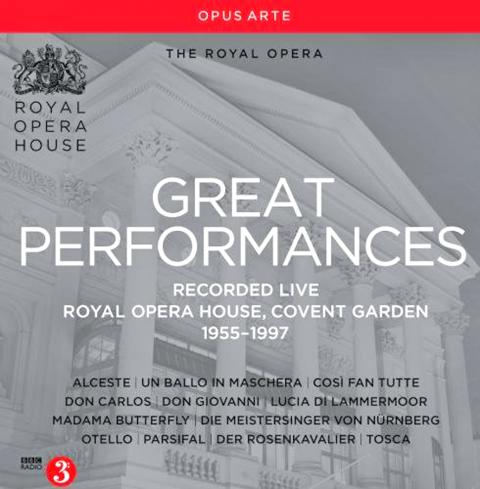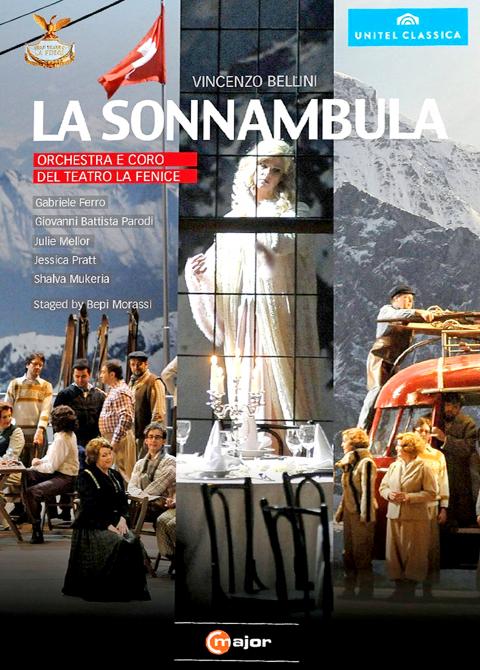GREAT PERFORMANCES
The Royal Opera House Covent Garden 1955-97
32 CDs

OA CD9024 D
What better way to begin the New Year than with opera, and in particular with more on the boxed set Great Performances from London’s Royal Opera that we began considering last month. It consists of 32 CDs containing 12 operas and selling for some US$106, with individual operas available on a download-only basis.
I’m no fan of Wagner’s last opera Parsifal. It seems to me to be in the category of late semi-failures, like Shakespeare’s Cymbeline, or, even worse, Timon of Athens, and Tolstoy’s Resurrection. Even so, it has necessity from time to time to be performed, and the recording in this boxed set is of no mean significance. Of prime interest is Jon Vickers in the title role, and Reginald Goodall as conductor.

The 1971 run of performances suffered a setback when Franz Crass canceled as Gurnemanz late in the rehearsal period, and no fewer than four soloists were engaged to replace him over six performances. The singer featured on the night this recording was made was the Belgian bass Louis Hendrikx. Other soloists were Amy Shuard as Kundry, Norman Bailey as Amfortas and Donald McIntyre (a magnificent Wotan in the Boulez/ Chereaux centenary Ring at Bayreuth) as Klingsor.
Goodall is famous for his slow tempi in Wagner, and not everyone will like his conducting of the Covent Garden orchestra here. To my ears, he misses the extraordinary melancholy and nostalgia that James Levine managed to evoke so wonderfully on his 1990 recording. But of Vickers there can be few complaints. Indeed, in the booklet accompanying the boxed set Nicholas Payne calls his performance “the most overwhelming assumption I have ever heard in the theater.”
This isn’t the only recording of Vickers as Parsifal (another is the famous one with Hans Hotter as Gurnemanz, conducted by Knappertsbusch, from 1964). But here the great Canadian tenor is at his peak, and his unmistakable tones are resplendent throughout. If you can take Parsifal, this is certainly a version to consider.
I’m infinitely more enthusiastic about Die Meistersinger von Nurnberg (“the mastersingers of Nuremberg”) than Parsifal. Rather than feeling he has to teach the world something, Wagner is reveling simply in being a part of it. It seems to me the opera transforms our perceptions of the composer, showing him capable of being the master of a sunny, socially realist humanism as well as of rocky mountain-top epics. The music is lovable in every bar, but with great depth when applied to the introspective Hans Sachs.
Covent Garden’s production, represented here in a 1997 recording, was conducted by the Dutch master, Bernard Haitink. His humanity and careful musicianship perfectly suited the equivalent characteristics of the marvelous score. John Tomlinson is Sachs, Thomas Allen is the comic Beckmesser and Swedish tenor Gosta Winbergh sings Walther. This revival was the final production at Covent Garden before the theater was closed for extensive refurbishment later that year.
Tomlinson’s voice easily rises above all the others, and Winbergh (a singer I hadn’t heard of before listening to these CDs) is every inch a Walther, rising to great heights in the prize song. Audience reaction at the end confirms that this was indeed a memorable occasion, as well as, if these CDs are to be believed, a sumptuous one.
LA SONNAMBULA
Bellini
Pratt, Mukeria, Parodi
C Major 713908
There’s no doubt that an opera like Bellini’s La Sonnambula (“the sleepwalker”) requires the injection of something novel and powerful to give it full credibility these days. The story is arguably ridiculous, and the music not Bellini’s most inspired. It’s true the opera gained modern popularity ahead of such Bellini works as Beatrice di Tenda and I Capuleti e I Montecchi, but it’s nevertheless wonderful to have a new DVD that refreshes the Sonnambula experience.
The 2013 production from the La Fenice opera-house in Venice (new in the Naxos Video Library) gains this freshness almost entirely from its scenery and costumes. The location is changed from a Swiss mountain village to a 1930s Swiss ski-resort. This gives the opportunity for four different scenes — the Alpine resort with a huge mountain panorama visible from a grandiose terrace, the Count’s luxurious bedroom, the terrace again but with a different mountain view (changed weather, presumably), and a finale set in an exceptionally finely-equipped restaurant.
The Australian soprano Jessica Pratt sings the heroine Amina with an unruffled confidence. With her copious blonde hair she certainly looks the part, and in addition she appears to produce her vocal pyrotechnics quite effortlessly. Shalva Mukeria, a native of Georgia (the country, not the US state), sings the constantly distressed Elvino with great panache and Giovanni Parodi is also excellent as the Count. The chorus looks magnificent in their affluent 1930s skiing costumes, and to have the Count arrive by ski lift, and the chorus later depart by an onstage glistening red bus, are both the kind of coup-de-theater that are this production’s strongest point. As for the splendid restaurant, when Amina sings “Where am I?” on awaking from her sleepwalking, you can well sympathize with her amazement.
This DVD, then, must now be rated as among the best available of this sometimes elusive opera.

May 11 to May 18 The original Taichung Railway Station was long thought to have been completely razed. Opening on May 15, 1905, the one-story wooden structure soon outgrew its purpose and was replaced in 1917 by a grandiose, Western-style station. During construction on the third-generation station in 2017, workers discovered the service pit for the original station’s locomotive depot. A year later, a small wooden building on site was determined by historians to be the first stationmaster’s office, built around 1908. With these findings, the Taichung Railway Station Cultural Park now boasts that it has

The latest Formosa poll released at the end of last month shows confidence in President William Lai (賴清德) plunged 8.1 percent, while satisfaction with the Lai administration fared worse with a drop of 8.5 percent. Those lacking confidence in Lai jumped by 6 percent and dissatisfaction in his administration spiked up 6.7 percent. Confidence in Lai is still strong at 48.6 percent, compared to 43 percent lacking confidence — but this is his worst result overall since he took office. For the first time, dissatisfaction with his administration surpassed satisfaction, 47.3 to 47.1 percent. Though statistically a tie, for most

As Donald Trump’s executive order in March led to the shuttering of Voice of America (VOA) — the global broadcaster whose roots date back to the fight against Nazi propaganda — he quickly attracted support from figures not used to aligning themselves with any US administration. Trump had ordered the US Agency for Global Media, the federal agency that funds VOA and other groups promoting independent journalism overseas, to be “eliminated to the maximum extent consistent with applicable law.” The decision suddenly halted programming in 49 languages to more than 425 million people. In Moscow, Margarita Simonyan, the hardline editor-in-chief of the

Six weeks before I embarked on a research mission in Kyoto, I was sitting alone at a bar counter in Melbourne. Next to me, a woman was bragging loudly to a friend: She, too, was heading to Kyoto, I quickly discerned. Except her trip was in four months. And she’d just pulled an all-nighter booking restaurant reservations. As I snooped on the conversation, I broke out in a sweat, panicking because I’d yet to secure a single table. Then I remembered: Eating well in Japan is absolutely not something to lose sleep over. It’s true that the best-known institutions book up faster